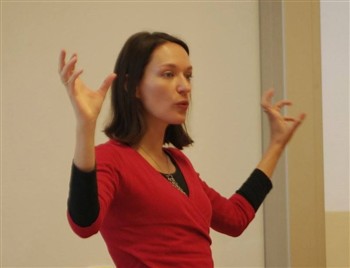Summer School: Epistemology and Cognition
From 25 to 29 August 2014, the Faculty of Philosophy at the University of Groningen will host two co-located summer schools with a common theme: Epistemology and Cognition. One of the summer schools will focus on contemporary philosophy and is co-organized with the Department of Philosophy of the University of Bristol. The other summer school will have a historical focus and is co-organized with the Department of Philosophy of the Radboud University Nijmegen.
The summer schools are intended for graduate students (master's and PhD), post-docs and early-career researchers in philosophy. The combination of systematic and historical focus makes these co-located summer schools particularly attractive for students and junior researchers who approach philosophical discussions in a global, non-fragmented way, and for whom contemporary debates and historical investigations can be fruitfully combined. Participants can follow exclusively one of the two tracks, or mix-and-match tutorials from both tracks according to their interests.

Each of the two summer schools will consist of tutorials by 5 lecturers, and a few slots for student presentations (in both cases, parallel sessions for the systematic and the historical tracks). In addition, we will have keynote speakers common to the two events.
> Coordinator: Dr Catarina Dutilh Novaes
> Application deadline: 1 July 2014
Keynote speakers
- Jeanne Peijnenburg (University of Groningen): "Fading Foundations"
- Rineke Verbrugge (University of Groningen): TBA
- Andrew Pyle (University of Bristol): "Locke and the Ethics of Belief"
- TBA
Groningen-Bristol Summer School on Epistemology and Cognition – contemporary perspectives
- Finn Spicer (University of Bristol): TBA
- Richard Pettigrew (University of Bristol): "Aiming at the truth: from the goal of accuracy to rationality constraints"
- Catarina Dutilh Novaes (University of Groningen): "Dialogical conceptions of reasoning"
- Jan-Willem Romeijn (University of Groningen): "Group rationality"
- Fred Keijzer (University of Groningen): "Cognition, embodied cognition, biocognition"
Groningen-Nijmegen Summer School on Epistemology and Cognition – historical perspectives
- Carla Rita Palmerino (Radboud University Nijmegen): "Impossible, possible and real: the role of thought experiments in early modern natural philosophy"
- Paul Bakker (Radboud University Nijmegen): "The Soul's Cognitive Powers in Late-Medieval and Renaissance Psychology"
- Hein van den Berg (Free University of Amsterdam and University of Groningen): "Instinct and animal cognition in Reimarus and Herder"
- Andrea Sangiacomo (University of Groningen): "Mind and Body: between union and identity"
- Sander de Boer and Han Thomas Adriaenssen (University of Groningen): "Medieval echoes in early-modern theories of cognition: empty slogans or hidden roots?"
Download flyer for Epistemology & Cognition summer school
Find all information on the University of Groningen's Summer School pages
This article was published by the Faculty of Philosophy.
More news
-
08 December 2025
Citizen participation essential for a sustainable energy future
-
02 December 2025
Trust in science requires integrity in communication
-
28 October 2025
The search for responsibility in the financial world
